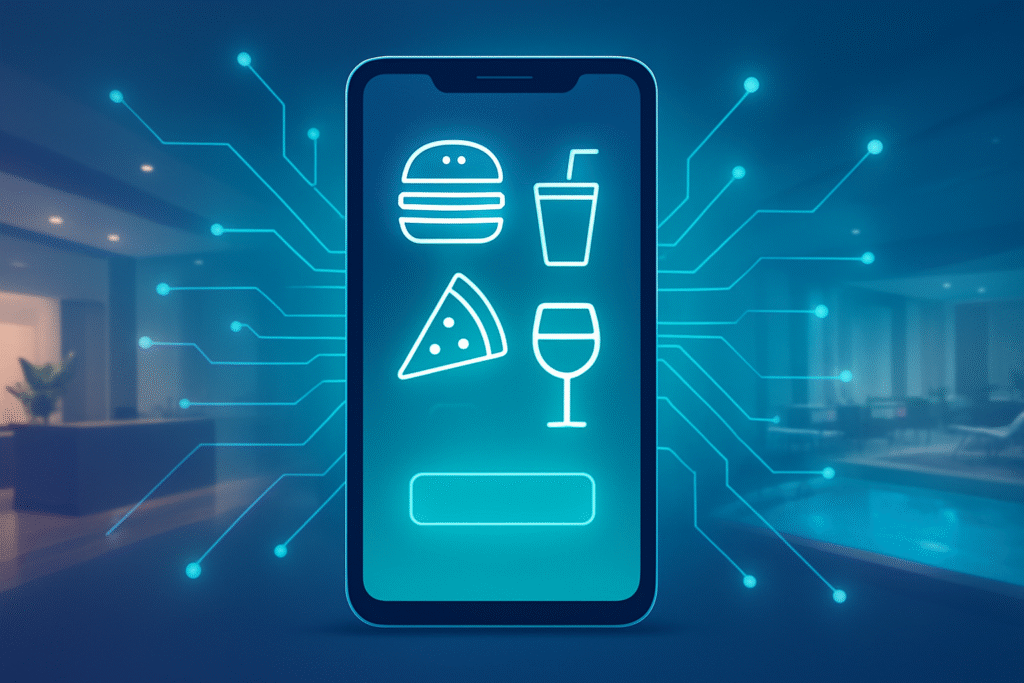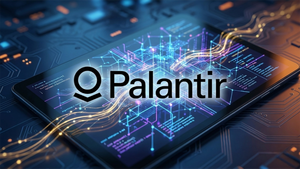Financial News
The Galt House Hotel Revolutionizes Hospitality with IRIS Mobile Ordering, Setting a New Standard for Guest Experience and F&B Innovation

Louisville, KY – In a significant leap forward for hospitality technology, The Galt House Hotel, a distinguished Wyndham Grand Hotel (NASDAQ: WH) and the largest hotel in Louisville, Kentucky, has officially adopted IRIS Mobile Ordering. This strategic implementation marks a pivotal moment in how hotels are leveraging cutting-edge digital solutions to not only streamline operations but also dramatically enhance the guest experience and drive substantial food and beverage (F&B) sales. The move underscores a growing trend within the industry towards sophisticated, guest-centric technologies that cater to modern demands for convenience and personalization.
The adoption of IRIS Mobile Ordering is poised to transform the hotel's F&B landscape, moving beyond traditional room service models to an integrated, contactless system accessible across the entire property. By empowering guests to order food, drinks, and amenities directly from their personal devices, The Galt House Hotel is setting a new benchmark for operational efficiency and guest satisfaction. This initiative highlights the critical role of innovative platforms in navigating the evolving expectations of today's tech-savvy travelers and maximizing revenue opportunities in a competitive market.
Unpacking the Technological Advancement: IRIS Mobile Ordering's Core Innovations
IRIS Mobile Ordering stands out as a robust digital platform meticulously engineered for the unique demands of the hospitality sector. Its core innovation lies in its comprehensive suite of features designed to offer a seamless, app-less mobile ordering experience. Guests can effortlessly browse visually rich menus, place orders, and complete payments directly from their smartphones, tablets, or laptops via a web browser, eliminating the friction of app downloads. This web-based approach is crucial for immediate guest adoption and convenience, aligning with the industry's shift towards frictionless digital interactions.
Technically, IRIS differentiates itself through its deep and seamless integration capabilities with existing hotel infrastructure, including Property Management Systems (PMS) and Point of Sale (POS) systems. This integration allows for automated guest verification—such as charging orders directly to a room by surname and room number—and real-time menu synchronization across all F&B outlets. Beyond basic ordering, the platform incorporates intelligent features like "Open Tab" functionality, enabling guests to accumulate orders and settle a single bill, and "Advance and Amenities Ordering" for pre-arrival requests or in-stay impulse purchases like flowers or groceries. These capabilities represent a significant departure from previous, often disjointed, approaches to hotel F&B, which typically relied on manual phone orders or limited in-person service.
Furthermore, IRIS Mobile Ordering incorporates smart upsell and related item suggestions, leveraging data to prompt guests with complementary items (e.g., pairing a wine with a steak) to increase average check sizes. The system also supports multi-outlet and multi-menu display, ensuring all dining options within the hotel are visible and accessible. Crucially, an advanced allergen search and filter function provides guests with essential dietary information, mitigating risks and enhancing personalized service—a feature often overlooked in simpler ordering systems. Initial reactions from the hospitality community emphasize the platform's intuitive design and its potential to unlock new revenue streams while simultaneously elevating service standards, making it a compelling solution for hotels seeking to modernize their operations.
Competitive Implications and Market Positioning in Hospitality Tech
The adoption of IRIS Mobile Ordering by a prominent establishment like The Galt House Hotel carries significant implications for AI companies, tech giants, and startups operating within the hospitality sector. IRIS, as the technology provider, stands to gain substantial market validation and an enhanced competitive edge. This high-profile partnership serves as a powerful case study, demonstrating the tangible benefits—such as reported F&B revenue increases of 20-40% for hotels using IRIS—and operational efficiencies that their platform delivers. This success could accelerate IRIS's expansion into other major hotel chains and independent properties, solidifying its position as a leading innovator in hotel F&B technology.
For larger tech companies and established hospitality solution providers, this development signals a clear market demand for integrated, intelligent mobile ordering systems. Companies offering traditional POS systems, property management software, or less sophisticated digital ordering solutions may face increasing pressure to innovate or risk disruption. The trend towards comprehensive, AI-powered guest engagement platforms suggests that future competitive advantage will lie in solutions that offer deep integration, personalization, and data analytics capabilities. This could spur further mergers and acquisitions as larger players seek to acquire agile startups with proven technologies like IRIS.
Moreover, the success of such implementations could prompt tech giants with broader AI portfolios to explore deeper vertical integration into hospitality. Companies specializing in machine learning for recommendation engines or natural language processing for voice assistants might find new avenues to apply their expertise, potentially partnering with or acquiring existing mobile ordering platforms. The market is increasingly valuing solutions that not only automate but also intelligently predict guest needs and optimize revenue, pushing all players to invest heavily in AI-driven features to maintain or gain strategic advantages.
Wider Significance in the Broader AI Landscape and Hospitality Trends
The Galt House Hotel's embrace of IRIS Mobile Ordering is a microcosm of a much broader trend reshaping the global AI landscape and, specifically, the hospitality industry. It underscores the accelerating shift towards hyper-personalized and automated guest experiences, driven by advancements in artificial intelligence and mobile technology. This move fits perfectly into the overarching trend of "smart hospitality," where every touchpoint is digitized and optimized to meet the evolving expectations of modern travelers who demand seamless, contactless interactions and instant gratification.
The impacts are multi-faceted. Operationally, it allows hotels to run leaner and more efficiently, particularly in an era of persistent staffing challenges. By automating order taking and processing, staff can be redeployed to focus on higher-value guest interactions, elevating the overall service quality. From a guest perspective, the convenience and personalization offered by IRIS significantly enhance satisfaction, fostering loyalty and positive reviews. The data analytics capabilities of IRIS also represent a crucial impact, providing hoteliers with invaluable insights into guest preferences, popular menu items, and peak ordering times. This data-driven decision-making empowers hotels to refine their F&B offerings, personalize marketing efforts, and optimize operational strategies, moving beyond guesswork to informed action.
Comparatively, this development mirrors previous AI milestones in other sectors, such as the adoption of AI-powered chatbots for customer service or recommendation engines in e-commerce. Just as these technologies revolutionized their respective industries by improving efficiency and personalization, mobile ordering platforms like IRIS are poised to do the same for hospitality F&B. The potential concerns primarily revolve around data privacy and security, as these systems handle sensitive guest information and payment details. However, robust platforms like IRIS are designed with these considerations in mind, emphasizing secure integrations and compliance, making the benefits far outweigh the risks for forward-thinking establishments.
Charting Future Developments and Applications on the Horizon
Looking ahead, the successful deployment of IRIS Mobile Ordering at The Galt House Hotel hints at several exciting near-term and long-term developments in hospitality technology. In the near term, we can expect to see wider adoption of similar web-based mobile ordering solutions across the industry, particularly as hotels seek to maximize ancillary revenue and enhance guest satisfaction without significant capital expenditure on proprietary hardware. Further enhancements to these platforms will likely include more sophisticated AI-driven recommendation engines that learn individual guest preferences over time, offering highly personalized suggestions that anticipate needs rather than just reacting to them.
Longer-term, the integration of mobile ordering systems with other emerging technologies will be paramount. We could see seamless connections with in-room voice assistants, allowing guests to verbally place orders that are then processed by the IRIS system. Augmented reality (AR) menus, offering immersive visual experiences of dishes before ordering, are also on the horizon, further enriching the guest journey. The data collected by these systems will become increasingly valuable, feeding into larger hotel-wide AI platforms that manage everything from predictive maintenance to dynamic pricing and hyper-personalized loyalty programs.
Challenges that need to be addressed include ensuring robust cybersecurity measures to protect guest data, maintaining seamless integration with an ever-evolving ecosystem of hotel technologies, and ensuring accessibility for all guests, regardless of tech proficiency. Experts predict that the next wave of innovation will focus on predictive analytics, where AI not only understands current guest behavior but also anticipates future needs and proactively offers services. This could mean a guest's favorite coffee being suggested upon waking, or a spa treatment offered based on their previous booking history, all orchestrated through an integrated mobile platform.
A Comprehensive Wrap-Up: Redefining Hospitality in the Digital Age
The adoption of IRIS Mobile Ordering by The Galt House Hotel represents a significant milestone in the ongoing digitalization of the hospitality industry. Key takeaways include the critical importance of contactless, mobile-first solutions for modern guest expectations, the substantial potential for increased F&B revenue through intelligent upselling and expanded service points, and the operational efficiencies gained by automating traditional processes. This development underscores a broader industry pivot towards technology that not only meets but anticipates guest needs, transforming the hotel experience from transactional to truly personalized and seamless.
In the annals of AI history within the service industry, this move will be remembered as a clear indicator of how machine learning and intelligent platforms are empowering traditional businesses to innovate and thrive. It's a testament to the power of well-implemented technology to drive both profitability and guest satisfaction simultaneously. The long-term impact is profound: hotels that embrace such integrated digital ecosystems will be better positioned to attract and retain guests, optimize their operations, and differentiate themselves in an increasingly competitive global market.
In the coming weeks and months, the industry will be watching closely for data on the sustained revenue growth and guest satisfaction scores from The Galt House Hotel's implementation. We should also anticipate similar announcements from other major hotel chains and independent properties eager to replicate this success. Furthermore, keep an eye on how IRIS and its competitors continue to innovate, particularly in areas like advanced personalization, predictive analytics, and deeper integrations with the Internet of Things (IoT) within hotel rooms. The era of the truly smart hotel is not just arriving; it's being actively built, one intelligent solution at a time.
This content is intended for informational purposes only and represents analysis of current AI developments.
TokenRing AI delivers enterprise-grade solutions for multi-agent AI workflow orchestration, AI-powered development tools, and seamless remote collaboration platforms.
For more information, visit https://www.tokenring.ai/.
More News
View More



Recent Quotes
View MoreQuotes delayed at least 20 minutes.
By accessing this page, you agree to the Privacy Policy and Terms Of Service.



